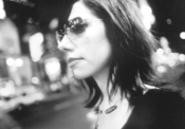Perhaps the fact that Harvey has done so few interviews on this tour, which finds her opening for U2, has something to do with the fact that she couldn't seem to make the connection. Or maybe she subconsciously didn't want to do the interview. Whatever the case may be, her confession is one of the most unguarded moments in an interview that, in typical Harvey fashion, doesn't reveal much about the media-shy singer-guitarist. After 10 years and six albums, Harvey certainly isn't a superstar, but she has become an icon of sorts. And even though her music hasn't found a wide audience, she has a loyal, almost cult-like fan base. A limited-edition collection of B-sides released in the U.K. five years ago regularly fetches close to $50 on eBay, and when Harvey embarked on a club tour last year, the shows all sold out instantly.
When Harvey released her debut, Dry, nearly a decade ago, it was before all that Riot Grrrl and Lilith Fair nonsense had swung into high gear. Dry was significant not because Harvey was a chick, but because of its intensity. Harvey wrote with the eloquence of a poet and played guitar with raw power. And if Dry's sexual content was explicit in a way that wasn't typical of the music at the time, it wasn't intentional.
"I just say what I feel I want to say as the person I am," Harvey says. "It never really dawned on me that I shouldn't be saying this because it's a male thing or it's unusual. I just see it as an individual, not as a genre or a gender."
While Harvey, who grew up in rural Dorset, England, has often elicited comparisons to Patti Smith, she says Smith is "not one of my favorite artists." Initially, Harvey played saxophone, but by the time she turned 18, she bought her first guitar and realized that it was her true calling. She turned down an opportunity to attend art school to study sculpture and began listening intently to American blues.
"I just started enjoying writing songs and being able to sing and play an instrument," she says. "I found it a vehicle for a form of expression through words as well. I was listening to John Lee Hooker, Muddy Waters, and Professor Longhair at the time. My parents listened to a lot of Hendrix, Stones, and Captain Beefheart. I was exposed to some really good things. I was lucky enough to have very cool parents."
Dry was so acclaimed that Harvey says she felt a certain amount of anxiety while making its follow-up, Rid of Me. (She declined to answer whether she had a nervous breakdown while recording it by saying, "I don't talk about my personal business in interviews, and that I regard as my personal life.") That album is a far more abrasive record, thanks in part to producer Steve Albini (Nirvana, Pixies, the Breeders), who buries Harvey's vocals in the mix and puts the emphasis on distorted guitars. When Harvey released 4-Track Demos, an album of alternate takes of some of the same songs on Rid of Me, it fueled speculation that she was unhappy with Albini's work -- something she says is simply not true.
"I'm very proud of that record and very pleased that I made it," she says. "I wouldn't change a thing. It was at Steve Albini's prompting and the rest of the band's prompting that the four-track demos that I made were things in themselves and were strong enough to hold together on their own. We all agreed that it was a good thing to do -- to show that side of the songs as well. Steve remains one of my good friends and someone I'd like to work with again."
Since then, Harvey's music has become much more accessible on albums such as 1995's To Bring You My Love, 1998's Is This Desire?, and her latest release, last year's Stories From the City, Stories From the Sea. And while the reality of the music business was something that she initially disliked, she's since learned to adjust and deal with that side of things.
"The nature of making art which then becomes public property was always a very difficult one for me at the beginning," she says. "Having to deal with all the business sides that I didn't have to deal with before -- lawyers, record-industry people, tour managers, agents, managers, and the list goes on and on. It took me awhile before I could find a way to handle all of that -- the pressure of knowing that the next set of songs you write are going to be heard by people, instead of writing purely for yourself."
Harvey admits that the steep ticket price for the U2 show will undoubtedly keep some of her most ardent fans away, but she plans to tour the U.S. again in September and play smaller venues. Other than that, she hasn't done much in the way of planning. While she likes the energy of New York, where she lived for eight months during the recording of Stories, she's not sure if she'll return there when touring wraps up at the end of the year.
"I'm on the road at the moment, so I don't really live anywhere," she admits. "It's fine. I love the people I'm with, and I love the music we're playing, so it's OK. I don't make any plans when I'm on tour. I just wait until after to land on my feet and then decide where I'll end up."












